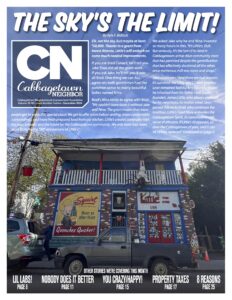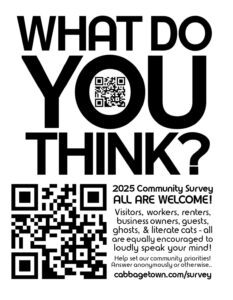
CABBAGETOWN, ATLANTA –
Over the course of two, September weekends in 2019, The Patch Works Art & History Center (The Patch Works) — in collaboration with the Cabbagetown Neighborhood Improvement Association (CNIA) and the Cabbagetown Initiative Community Development Corporation (CICDC) — revived Cabbagetown: 3 Women… an Oral History Play With Music, 41 years after its premiere at Atlanta’s Academy Theatre on May 21st, 1978.
Cabbagetown: 3 Women was written in 1977-1978 by R. Cary Bynum, shortly after his wife Brenda had presented him with an obscure cookbook entitled Cabbagetown Families, Cabbagetown Food. The cookbook was published in 1976 by Patch, Inc. (edited by Pam Durban, who went on to become an award-winning novelist) and contained oral-history transcripts of several Cabbagetown “Original” residents, three of whom Mr. Bynum chose for his play. Cabbagetown: 3 Women places the spotlight on the lives of three, real-life women: Lila Mae Brookshire (Joyce Brookshire’s mother), Effie Dodd Gray, and Beatrice “Aunt Beadie” Dalton. As Mr. Bynum writes in Foxfire Press’ 1984 edition of the play, he took the words of Lila, Effie, and Aunt Beadie “and arranged them into a dramatic format, careful to preserve as much of the original language as possible.”
Throughout the show, the three women talk about their backgrounds, daily routines, working at the mill, feeding their families, and dealing with life in the mill-village streets. As they explain early in the show, Cabbagetown (or Cabbage Town) was not the neighborhood’s true name, but instead a somewhat offensive nickname given to the inner-city community by outsiders for various different reasons.
In 1881, a new and eager workforce — many of Scotch-Irish descent — came down from the North Georgia Mountains and Piedmont to work at Atlanta’s recently opened Fulton Cotton Spinning Company, which was founded by a German-Jewish immigrant named Jacob Elsas. In order to house the workers, Jacob constructed rows of mill homes, originally known as Factory Lot. Years later, as the mill prospered and changed its name to Fulton Bag & Cotton Mills, the community also grew and became Fulton Mill Village. According to today’s Originals, the nickname of Cabbagetown didn’t gain widespread popularity until the 1940s or even 1950s, and even then, quite a number of local residents refused to use the name.
Throughout the 1970s and 1980s, Patch, Inc. was a Cabbagetown-based, nonprofit organization that provided socioeconomic support, creative outlets, and educational opportunities for the residents. It had a core staff of nine people and a Board that included founder Esther Peachey Lefever, Joyce Brookshire, Leon Little, Robert Price, and Dr. Louis Jacob (“Skip”) Elsas. Publishing Cabbagetown Families, Cabbagetown Food was the Patch’s way of preserving some of the unwritten tales about Cabbagetown, and when Mr. Bynum approached the organization with the concept for his play, the Patch warmly received the idea. Joyce Brookshire, a singer/songwriter and long-time resident of Cabbagetown, offered some of her songs to the production.
The original cast included: Doris Bucher, Annette Coleman, and Brenda Bynum. Joyce herself performed the music. As the Alliance Theatre wrote in its program for the 1979 presentation of the play, “Live music is movingly woven into the performance by Joyce Brookshire, accompanied by Fritz Rauschenberg, with songs she wrote about the families with whom she grew up, and originally were published in Foxfire Records premiere album, North Georgia Mountains.”
Cabbagetown: 3 Women is a heartfelt, sometimes comical, anecdotal play that celebrates the identities of a people in a tightly woven community.



